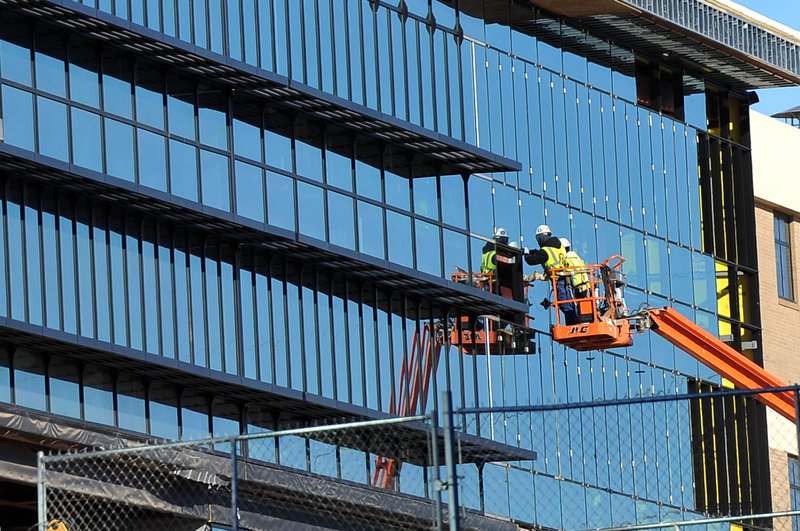Northwest Arkansas saw a spate of public works projects during the recession. The largest share was at the University of Arkansas.
The university completed 107 capital improvement projects at an estimated total cost of $265 million from 2008 through 2013, said spokesman Steve Voorhies.
"The University of Arkansas' expansion propped it up," Michael Harvey said of Northwest Arkansas' economy during the recession. Harvey is chief operating officer of the Northwest Arkansas Council, a group of local business and community leaders that focus on regional issues.
"And there were others, when you look at all of the public sector projects going on," Harvey said.
The University, regional school districts and local governments did not time these public works during the economic slowdown as policy, Harvey said, but the timing couldn't have worked out better if they had.
"There was no Keynesian stimulus conspiracy going on," he said, referring to the economic theory that government deficit spending can boost a faltering economy. "We're just really fortunate that we had those projects when we did," he said. "The economic lick would have been a lot harder without them."
Those projects included:
w/ Voter-approved renovation and expansion of Fayetteville High School in September 2010. That project is continuing and has an estimated total cost of $93 million.
w/ Springdale School District voters approved a $70 million program for a new middle school and junior high school in a close vote in May 2011.
w/ Voters in the city of Rogers approved $135.4 million in projects, mainly streets and parks, in September 2011.
"It was the most aggressive bond issue vote we ever had, in terms of the dollars sought, in the worst economy in which we ever had in one of these elections, and it passed by a bigger margin than any previous bond issue," said Rogers Mayor Greg Hines of his city's 2011 vote.
"We didn't have it as bad as other parts of the country, but people were hurting. Businesses were hurting," Hines said. "And they passed it anyway. The best reason I can come up with is that we have a history of telling people exactly what the money they approve will be spent for, and then we go out and do exactly that."
That candor about spending is a trait the city of Rogers and many of the region's other political entities share, he said.
"There's a level of trust there that's taken decades to build," he said.
"I think people also know that these projects are not just lifestyle improvements for people who already live here," Hines said. "It's an economic development question. We expected the water park we built out of this last issue would cost about half a million dollars to operate and have about half a million dollars in revenue each year. Well, it cost a little less than half a million dollars to operate and brought in about a million dollars the first year, and that's not all from Rogers."
Jeff Koenig of Fayetteville, a backer of the Fayetteville High School expansion and a businessman, said the school expansion was a major help to the economy, but the project overshadowed other important public works projects going on at the same time.
"Without a doubt, when you have a high school project just this side of $100 million, it's a big impact," Koenig said. "It's one of the most significant school-related projects in the state." But earlier projects such as the Fayetteville Public Library and the Fayetteville Boys and Girls Club continue to pay dividends and set the pact for future expansion, he said.
NW News on 03/23/2014

